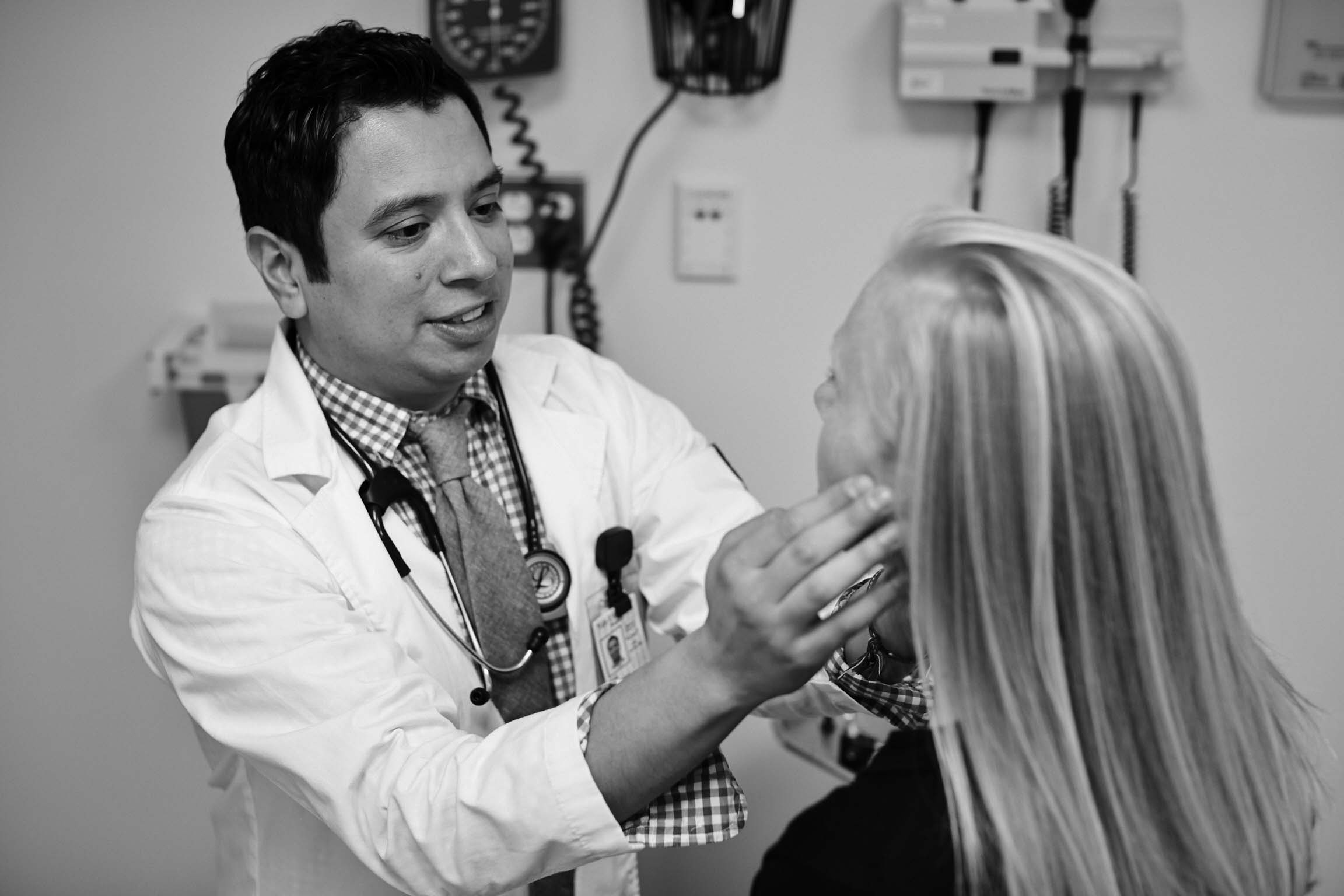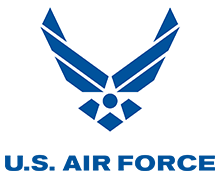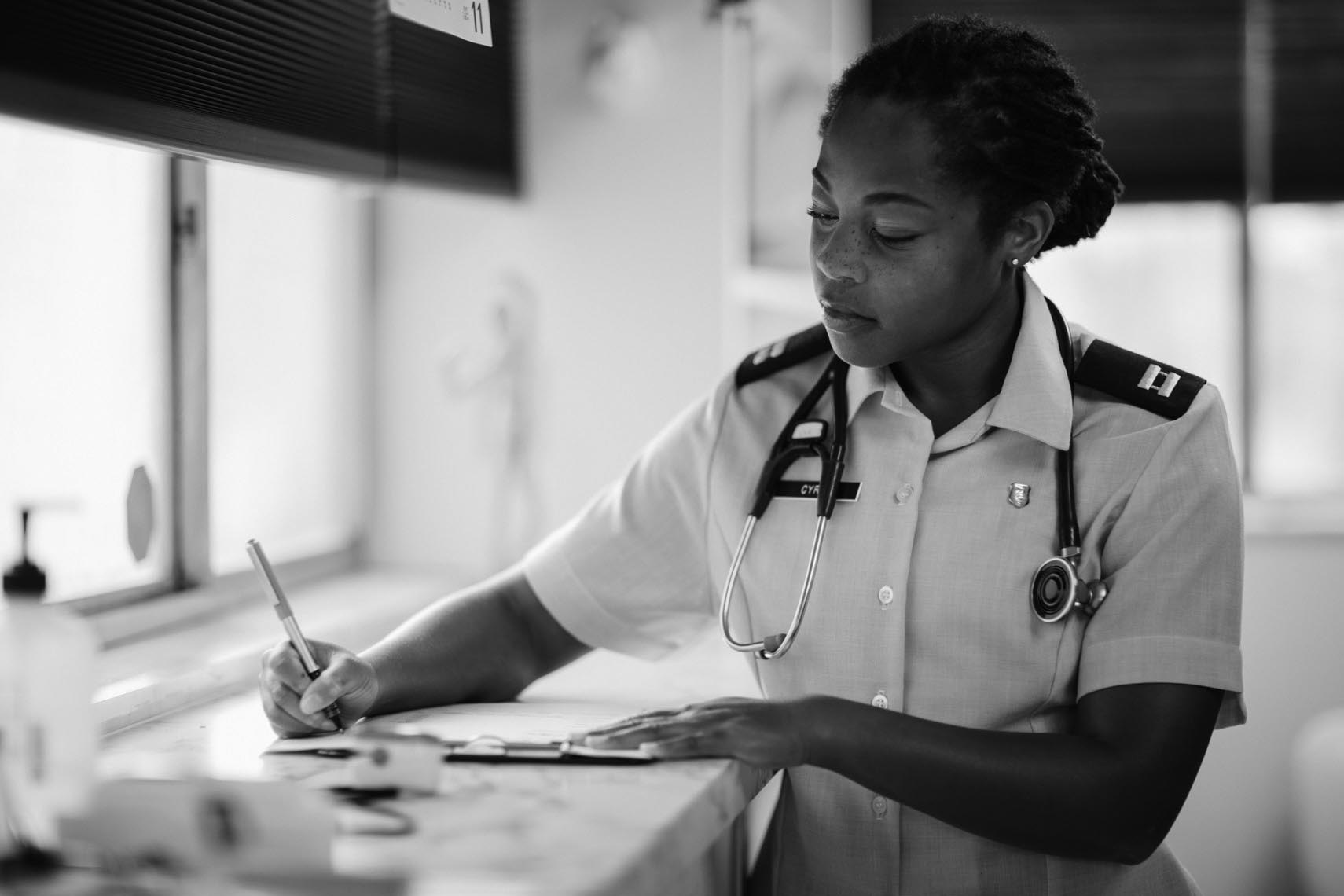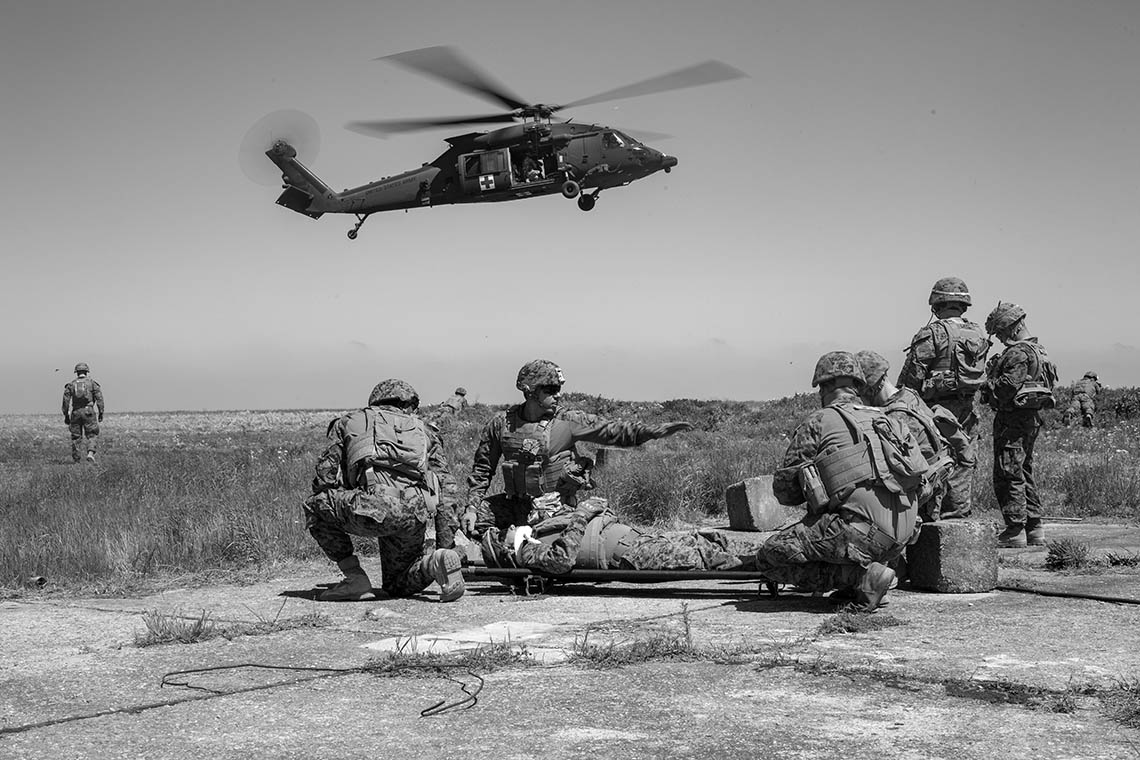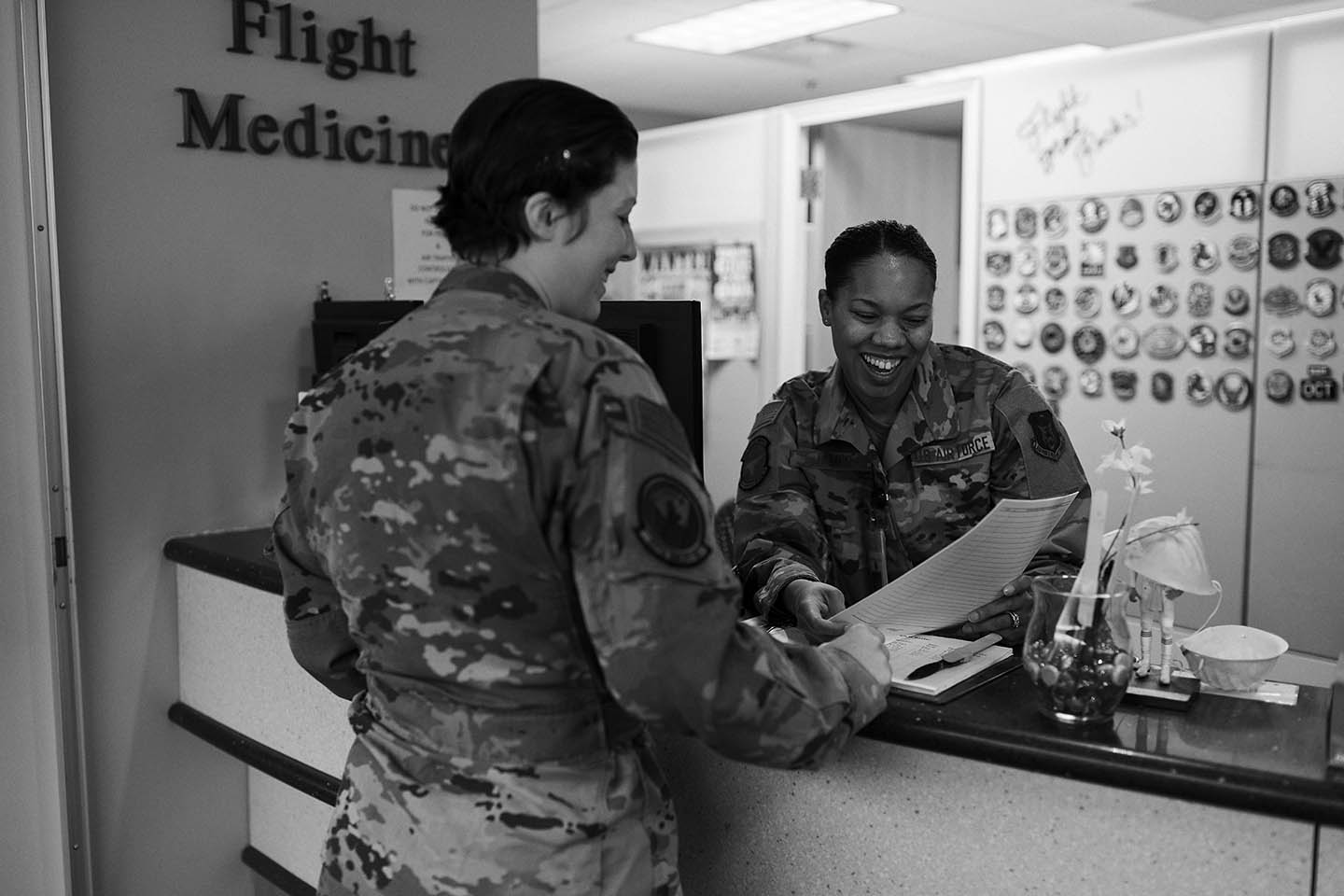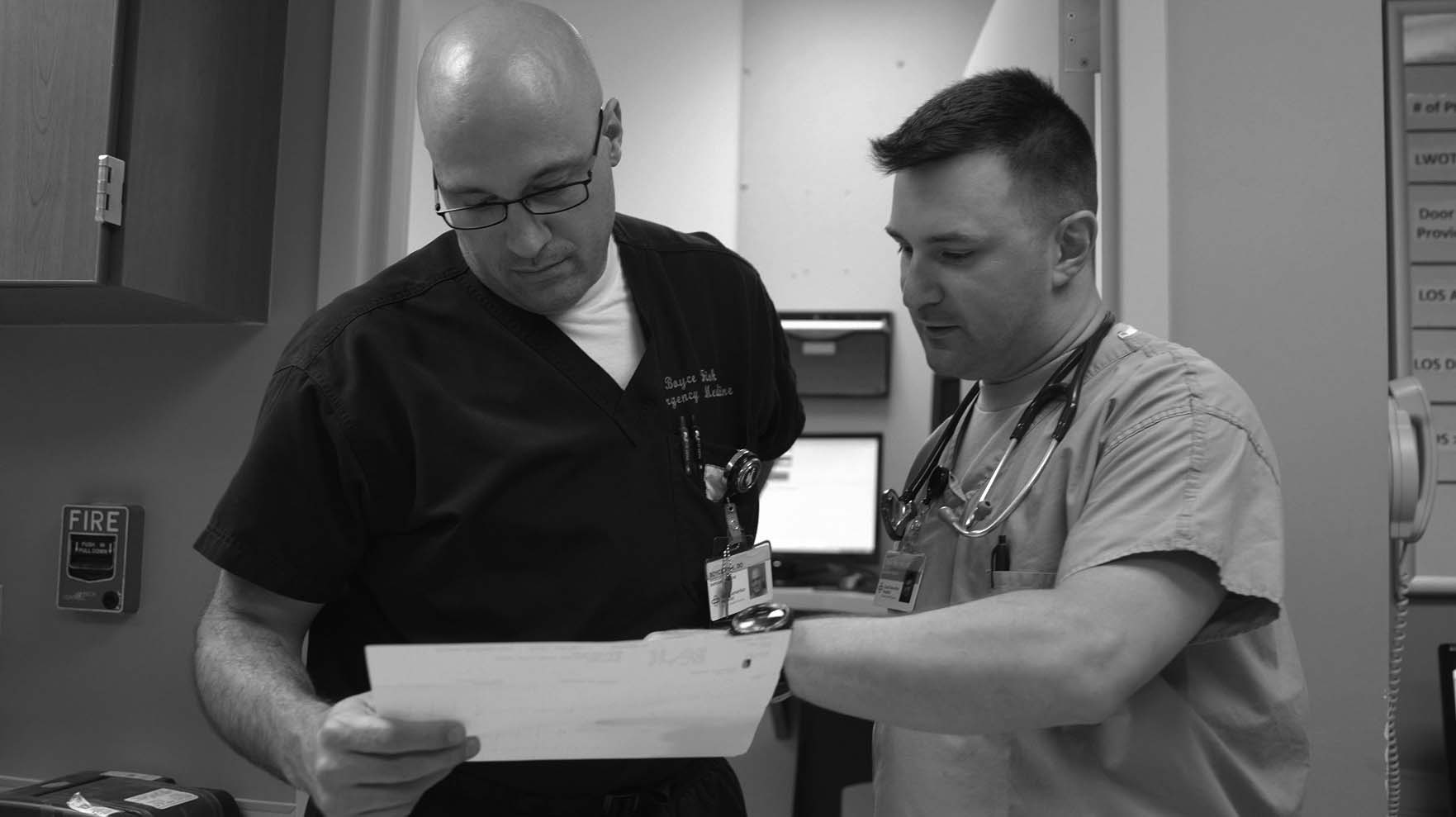- FAQs
- |
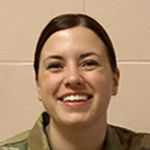
Sara Burdash, M.D.
Field Surgeon
- Service Branch: Army National Guard
- Location: Camp Ripley
- Specialty: Emergency Medicine
Sara Burdash, M.D., lives in Minneapolis, Minn. and has a full-time civilian job as an emergency medicine physician. She is also a part-time field surgeon in the Army National Guard and attends military training one weekend a month and two weeks a year.
”I’m honored to be able to mentor the next generation of medical providers.“
Sara Burdash, M.D., lives in Minneapolis, Minn. and has a full-time civilian job as an emergency medicine physician. She is also a part-time field surgeon in the Army National Guard and attends military training one weekend a month and two weeks a year.
”I’m honored to be able to mentor the next generation of medical providers.“
01:05AM
"This is my French bulldog, Lucy, and my Boston terrier, Frank. We also have a new puppy! They're quite funny. Three dogs can be hard to manage, but we don't have kids, so it's all relative. My husband and I have different schedules, but someone is always around to give them attention."
"This is my French bulldog, Lucy, and my Boston terrier, Frank. We also have a new puppy! They're quite funny. Three dogs can be hard to manage, but we don't have kids, so it's all relative. My husband and I have different schedules, but someone is always around to give them attention."
01:49PM
"This whiteboard proves that being a nerd can be fun. My life motto is to be so organized that I have time to be spontaneous. We have a list of the fun things we want to do so that when we have downtime, we're never wondering how to use it. I make so many decisions at work that when I come home, it's nice to not have to make more."
"This whiteboard proves that being a nerd can be fun. My life motto is to be so organized that I have time to be spontaneous. We have a list of the fun things we want to do so that when we have downtime, we're never wondering how to use it. I make so many decisions at work that when I come home, it's nice to not have to make more."
12:50 AM
"I'm almost finished with my shift at my civilian job, where I work as an emergency medicine physician in the emergency department of the University of Minnesota Medical Center. Now I just have to get home, see my husband and dogs, get a bit of dinner and pack for my drill weekend with the National Guard."
"I'm almost finished with my shift at my civilian job, where I work as an emergency medicine physician in the emergency department of the University of Minnesota Medical Center. Now I just have to get home, see my husband and dogs, get a bit of dinner and pack for my drill weekend with the National Guard."
02:00AM
Coming Home After a Late Shift at the Hospital
Sara is a full-time physician in the emergency department at the University of Minnesota. She often works a late shift, so she and her husband have late-night dinners to accommodate her schedule. Tonight, they are spending quality time before she leaves for the weekend for her monthly military training.
Coming Home After a Late Shift at the Hospital
Sara is a full-time physician in the emergency department at the University of Minnesota. She often works a late shift, so she and her husband have late-night dinners to accommodate her schedule. Tonight, they are spending quality time before she leaves for the weekend for her monthly military training.
BURDASH: I’m Sarah Burdash, and I’m an emergency medicine physician at the University of Minnesota, but I’m also a captain in the Minnesota National Guard. Most of my hours in the emergency department are in the afternoons and evenings, so the earliest shift I usually work starts around 1 p.m. The later shifts start around 4:30 or 5 p.m. Tonight I’m going to have to get all packed up, and tomorrow morning I leave bright and early. We’re going to be driving up to Camp Ripley in Minnesota; it’s about two, two and a half hours away. This particular drill weekend, we’ll be doing our periodic health assessments, we’ll be doing training.
Oh, Hi guys! Hello! Hey.
AARON: How are you doing?
BURDASH: Good. We should eat, I’m hungry.
AARON: Yeah? I can get it started for us.
BURDASH: OK. The other thing we get to do tomorrow is the aviation unit’s bringing the Blackhawk over, so we’ll be able to practice hot loads, cold loads, and get the medics in on that. So that should be good. So we’re doing that, we have some PHAs to do. And we should be able to do some medic classes. So.
AARON: That’ll be fun.
BURDASH: Yeah.
AARON: That’s good. Do you teach them also, or?
BURDASH: Some of them. Yeah. So some of the NCOs are teaching some of them, and I’m just adding on.
So we’ve finished dinner, and now I’m going to start getting ready.
I am notoriously not a morning person. It’s the advantage of those evening ER shifts, but I like to pack as much as I can the night before a drill. All right. So, we definitely want to make sure we get this in the vehicle the night before. So this little bin here, I actually keep out in the garage, it’s got my tactical stuff in it. So this way, with it being all in one spot, got my helmet, my vest, I don’t have to go looking for all the individual pieces each time that I need it. So, I’ve got this already all loaded in here. Basically at this point, all I’ve got to do now is get a good night’s sleep so we can get on the road first thing in the morning.
02:02AM
"This is my general work schedule. The hospital is typically really good about scheduling my shifts around my military responsibilities. You also can see there are blocks of days off in between, so I definitely feel like I have enough days to enjoy free time."
"This is my general work schedule. The hospital is typically really good about scheduling my shifts around my military responsibilities. You also can see there are blocks of days off in between, so I definitely feel like I have enough days to enjoy free time."
07:10 AM
Practice Medicine in the Army National Guard
As she leaves for once-a-month military training, Sara explains her part-time commitment as a member of the Army National Guard.
Practice Medicine in the Army National Guard
As she leaves for once-a-month military training, Sara explains her part-time commitment as a member of the Army National Guard.
BURDASH: In the National Guard, we have two roles. We have duties both to our state and our local communities, as well as to the nation. And so, we all have civilian jobs that we work at mostly. And then, one weekend a month, and two weeks in the summer, we get to go to our National Guard training, and whether it be locally for us, or a little bit further away, like we’re going today to Camp Ripley. If we are needed, either nationally if there’s a national disaster or something like that, where they need a medical unit in this case, we’ll go assist with that. Or if there’s an international need, a peace treaty, some sort of combat mission, then we get to go to those as well. So, we have multiple purposes we can fill.
08:34AM
Drill Weekend At Camp Ripley
This morning, Sara is driving to Camp Ripley instead of the armory, a National Guard military building, where she typically trains. Her unit goes to Camp Ripley a few times a year to participate in a consolidated drill weekend and use the camp's more robust facilities.
Drill Weekend At Camp Ripley
This morning, Sara is driving to Camp Ripley instead of the armory, a National Guard military building, where she typically trains. Her unit goes to Camp Ripley a few times a year to participate in a consolidated drill weekend and use the camp's more robust facilities.
BURDASH: Camp Ripley is a bigger facility, almost like the more formal military forts, but smaller than that. But bigger than our individual armories that we usually have for our monthly drills, where we can go and execute more what we call consolidated drills. So we’re an individual company, which is a group of soldiers that work as one together unit. And we are part of then a bigger unit above that. And so, by going to Camp Ripley, it allows our next step up, the bigger unit all to get together in what we call a consolidated drill, where we’re all at the same place. And so, there’s our medical company, a headquarters company, a financial group, a transportation group. We have all kinds of different types of groups involved within that one bigger group, and we all get to be at the same place at the same time. There’s more resources up here, and so we have weapons ranges, we have treatment facilities, it’s more so like a classic military base, but just a little bit on a smaller scale.
08:45AM
"Passing through the main gates of Camp Ripley reminds me of walking into a sporting event center. I know I'm here to play ball. I'm here to do work and to do business. You put your game face on."
"Passing through the main gates of Camp Ripley reminds me of walking into a sporting event center. I know I'm here to play ball. I'm here to do work and to do business. You put your game face on."
09:00AM
Drill Weekend Formation Ceremony
Once Sara arrives to Camp Ripley, she attends military formation, a formal gathering that kicks off drill weekend.
Drill Weekend Formation Ceremony
Once Sara arrives to Camp Ripley, she attends military formation, a formal gathering that kicks off drill weekend.
BURDASH: All right, so we just got here at Camp Ripley, that’s the area where we’re going to be doing our formation, and so we’re going to walk over and meet the rest of the crew, and get ready to start the weekend. Being in the National Guard has its own sense of community, and you go through some hard times, and you go through some great times. And so you really do get to bond, and it’s almost like a little family, really.
MALE: Stand at.
CROWD: Stand at.
MALE: Ease. Morning 204.
CROWD: Morning sir.
MALE: All together again. Thank you for your performance and exemplary representation of our unit during annual training. So, nice job.
BURDASH: I think the formation does two big things. The first one is that it’s an accountability situation. And so, we’re able to verify that everybody got here safely, everybody’s here when they should, so that we can execute our missions. But the other thing that it lets us do is I think it reminds us that even though we’re a medical unit, is that we’re still soldiers.
MALE: Company.
MALE: Attention.
CROWD: Heal the warrior.
09:05AM
"Our guidon distinguishes our medical unit from other units. I belong to the 204th Area Support Medical Company."
"Our guidon distinguishes our medical unit from other units. I belong to the 204th Area Support Medical Company."
10:00AM
Drill Weekend Accommodations
After formation, Sara goes to her room to unpack and settle in before starting the rest of her day. She's staying in the officer quarters, which provide her with everything she needs for the weekend.
Drill Weekend Accommodations
After formation, Sara goes to her room to unpack and settle in before starting the rest of her day. She's staying in the officer quarters, which provide her with everything she needs for the weekend.
BURDASH: All right. So, just head on in. Here in one of, actually one of our kind of one of the buildings where the officers stay often. Just a little bit more space than the usual barracks. And so we’re coming in, and we have to find out which room we’re in this time. Think it's in room seven. All right. Well, here we go then. Got a microwave and a TV. And here’s the sleeping quarters. Not too bad. I’ll take it. Better than a twin size. Always hard to do Army hair? There’s a little bit more space than the barracks. A little bit more to work with. And extra uniforms, just get some of these out so we’ll have them ready in case we need them. OK.
10:05AM
"I like to bring an extra uniform or two for drill weekends because they can get dirty and sweaty. My uniform is one of the newer ones cut to better fit females. They also have Velcro, so you can remove your patches before washing them. When you first join, you are given a $400 clothing allowance. Officers need to buy their own uniforms, and we get them from the clothing store on post or from a military website."
"I like to bring an extra uniform or two for drill weekends because they can get dirty and sweaty. My uniform is one of the newer ones cut to better fit females. They also have Velcro, so you can remove your patches before washing them. When you first join, you are given a $400 clothing allowance. Officers need to buy their own uniforms, and we get them from the clothing store on post or from a military website."
10:07AM
"This is a spare patch that represents my rank. I'm currently a captain, and I've been getting my paperwork together for consideration to be promoted to major. Before we had Velcro patches, our rank was typically pinned on. They still call it 'pinning your rank on you' at promotion ceremonies."
"This is a spare patch that represents my rank. I'm currently a captain, and I've been getting my paperwork together for consideration to be promoted to major. Before we had Velcro patches, our rank was typically pinned on. They still call it 'pinning your rank on you' at promotion ceremonies."
11:00AM
How to Load Patients onto a Black Hawk Helicopter
One of Sara's responsibilities as a National Guard physician is to train the Guard's medics to be prepared for any situation. Today her team is training on how to load and unload patients onto a UH-60 Black Hawk.
How to Load Patients onto a Black Hawk Helicopter
One of Sara's responsibilities as a National Guard physician is to train the Guard's medics to be prepared for any situation. Today her team is training on how to load and unload patients onto a UH-60 Black Hawk.
BURDASH: We’re going to do some drills with our medics with helicopter loading and offloading. We have physicians that help lead classes; we have PAs that help lead classes. We actually rotate a little bit who gets to teach the classes, and then it lets everybody use their expertise.
This is so important, especially for us as our role in an area support medical company, because we may be in a position to both be sending and receiving patients. Our role is a little bit versatile in that regard. And so, our team may very well be loading patients on helicopters. Maybe taking them off.
We’re going to be practicing our hot loads. And so basically practicing loading with the helicopter blades going, just as if it would be in real life. So they’re moving now to the bird, to the helicopter. Moving as one. Once they get instructions from either the crew chief or the medic who’s in the helicopter, they’ll be able to load the patient in. They’re just trying to slide the litter into a safe position so that the helicopter crew can safely take care of the patient. And then they’re all going to hold onto each other to make sure they can move as a unit away from the helicopter as a safe group, and they don’t lose anybody in the process.
Helicopter crews are very good about giving us the sickest patient first. So they’ll usually bring the patient into our facility, where myself, a team of medics, will receive them, assess them, and get the sign out from the helicopter crew about what’s happened, what’s been done. What needs to be done, and take care of the patient from that standpoint.
11:23AM
"The inside of a UH-60 Black Hawk has an elevated platform that allows two patients to be stacked, one on top of the other."
"The inside of a UH-60 Black Hawk has an elevated platform that allows two patients to be stacked, one on top of the other."
12:10PM
"Before my next training, I stop to grab a grilled chicken wrap from the snack shack on base. They are actually quite delicious. Our unit has cooks in it and they make spaghetti, hamburgers and all kinds of stuff."
"Before my next training, I stop to grab a grilled chicken wrap from the snack shack on base. They are actually quite delicious. Our unit has cooks in it and they make spaghetti, hamburgers and all kinds of stuff."
01:00PM
Hip-Pocket Training Lesson
In between training exercises, Sara gathers the medics for a quick, on-the-spot medical lesson known as "hip-pocket training." Here she applies her emergency medicine expertise to teach them when to suture or staple a wound.
Hip-Pocket Training Lesson
In between training exercises, Sara gathers the medics for a quick, on-the-spot medical lesson known as "hip-pocket training." Here she applies her emergency medicine expertise to teach them when to suture or staple a wound.
BURDASH: All right. Next topic, who’s got one?
FEMALE: Things that you would suture of staple, and why one versus the other.
BURDASH: Sure. Yeah, that’s a great one. The idea is, is you want to do the best to help the body heal without doing any harm. That's key. You know, it’s the first rule of medicine is first do no harm. Primum no killum. I like to do stitches on almost all things, unless they are very big, or sometimes scalps are a nice place to do staples. Or if you’re in a situation where speed is of the essence. So if you’ve got a cut like that, all we want to do is bring these edges together to be able to let the body heal itself. And so, we can do that with staples, where we’ll push the skin together, so we’ll push it and hold it like that, and then we put staples in to hold the edges together. Or, we can kind of bring the skin together, and we put a needle in here through this part of the skin, out through this edge, on this side, into the skin here. And out on the other side. And we get to tie it in a knot.
So we just finished some hip pocket or just in time training where we had a little lull while we were waiting for some additional equipment before our next class, so we basically just talk about whatever the soldiers want to talk about. Or whatever would be helpful at the time. We’ve talked about all kinds of things in the past. This time we just talked a little bit about wound cares, and respiratory infections. But we’ve just been informed that our equipment has arrived for the other class that we’re going to be doing, so we’re stopping this as needed type training, and we’re going to be moving over to our actual next class.
02:00PM
How To Suture A Wound
During her monthly drill weekends, Sara hosts a variety of classes to teach medics information or skills related to their military and medical roles. Today, she has them practice their suturing skills using a pig's foot.
How To Suture A Wound
During her monthly drill weekends, Sara hosts a variety of classes to teach medics information or skills related to their military and medical roles. Today, she has them practice their suturing skills using a pig's foot.
BURDASH: So, let’s come on down here, and now we’ve talked about those wound cares a little bit. So, let’s give a quick demonstration. And then we’ll break into stations here and you all can give it a try.
Simple wounds like this are so, so common. They don’t have to be combat-related. This is, you know, somebody cutting themselves trying to open a package, this is, you know, falling out of a truck, you know, you stumble out and you scrape your leg. So this is something that’s very common, and something we’re guaranteed to see at some point in our careers.
Needle at 90 degrees. And then you go through the skin, and try to come out on the other side of your wound, about the same distance that you went in on. Yeah, and that’s great, what you did right there.
We have a nice partnership actually with a local butcher who gives us a good deal on pig’s feet. We’ve done classes where we do a cricothyrotomy, or cric, and so you have to make a cut into the airway, and place a breathing tube through that. So we’ve bought pig tracheas before, and we’ve also bought racks of ribs to practice doing chest tubes, as if we would between human ribs. And so, I think the butcher gets good business out of us on things that maybe nobody else is buying, so he can’t be wrong with that. But it gives us a really good, tangible experience because a lot of the stuff, you just can’t learn unless you feel it. To put a chest tube in, you have to feel what it feels like to go in between the tissue of ribs. To have the confidence to do a procedure where you have to use a tool on another person, it’s helpful to have done it at some point before, so that, you know, the first time that they’re doing some sort of lifesaving procedure, and they’re realizing they’re going to have to make a cut in somebody’s throat, they aren’t having to do it for the first time just brand new, having never actually held a scalpel and cut something. And so this is what we try to do to prepare them to be safe to be able to do their jobs.
02:17PM
"That thing that looks like pliers is the needle driver. It allows you to have good control of the curved needle without having too much wiggle. The string is called a suture. Commonly, suturing needles are curved to allow the natural turn of your wrist to go through the tissue more easily."
"That thing that looks like pliers is the needle driver. It allows you to have good control of the curved needle without having too much wiggle. The string is called a suture. Commonly, suturing needles are curved to allow the natural turn of your wrist to go through the tissue more easily."
02:21PM
"During hip-pocket training we talk about random things the medics want to learn about or topics we think they would benefit from and we'll just go down either a figurative or literal list until we've covered all of the topics or run out of downtime. There was a question about respiratory infections and this was a drawing I made as we talked through where patients can get respiratory infections."
"During hip-pocket training we talk about random things the medics want to learn about or topics we think they would benefit from and we'll just go down either a figurative or literal list until we've covered all of the topics or run out of downtime. There was a question about respiratory infections and this was a drawing I made as we talked through where patients can get respiratory infections."
02:45PM
"We got pigs feet today from a local butcher in a nearby town. We've also gotten tracheas (windpipes), ribs and various other things for our training exercises. I think it aids the learning by making it more engaging."
"We got pigs feet today from a local butcher in a nearby town. We've also gotten tracheas (windpipes), ribs and various other things for our training exercises. I think it aids the learning by making it more engaging."
03:00PM
Advantages Of An Army National Guard Physician
Sara takes a moment to talk about the advantages of being in the Army National Guard and the importance of being a mentor.
Advantages Of An Army National Guard Physician
Sara takes a moment to talk about the advantages of being in the Army National Guard and the importance of being a mentor.
BURDASH: As a physician in the Guard, we have multiple responsibilities. First and foremost is to be a soldier. When I say be a soldier, it’s to know how to defend yourself, defend your patients, defend your peers. There’s the education of soldiers. Working in a medical unit, I have people who signed up to be combat medics, and they might have done it to pay for school, they might have done it to prepare themselves because they’re going to go into PA school, or nursing, or dentistry, and we have lab techs, we have all kinds of folks who are going into the medical field. And maybe they’re using this as their opportunity to educate themselves. As a provider who got all of that civilian experience, trained at, you know, well known programs, I get to use that experience to help those young folks, and that’s the same thing that happened for me, I had an ER doc train me when I was a medic. So, I feel to pass that along is really helpful, and I think a good responsibility to try to further and mentor the next generation of medical providers.
04:00PM
Annual Weapons Qualification
Sara's primary responsibility as a Guard physician is to be a solider, and to know how to defend herself, her patients and her peers. She's required to participate in an annual weapons qualification to ensure she's proficient in her assigned duty weapon.
Annual Weapons Qualification
Sara's primary responsibility as a Guard physician is to be a solider, and to know how to defend herself, her patients and her peers. She's required to participate in an annual weapons qualification to ensure she's proficient in her assigned duty weapon.
BURDASH: Right now, we’re at our nine millimeter weapons range. So we’re getting ready, we’re getting all set up for the day. All the safety staff are getting here, and we’re starting to get all the ammo ready, and what we’ll be doing is firing at these, actually. They’ve changed the regulations, so now the way we fire, not only we’ll be standing and firing at the targets, but we also get to walk towards them and fire that way. So, that’ll be a new adventure. Like you see, you can see all the range; these will actually pop up and pop down. And then we’ll have multiple firers going at once. So I’ll be one of those firers. We’ll actually be changing magazines while we walk forward towards the firing line, from the back. So it’ll be a little bit more dynamic, a little bit more realistic.
This is part of our annual qualifications. We have to make sure that we are proficient in whatever our assigned duty weapon is. Last time I shot, I shot expert. So, that’s my goal. And if not, at least we’ll have a good time, and try to hit as many targets as we can.
MALE: Firers, at this time, go ahead and move out. Cease fire there, cease fire. Clear off make sure that it’s clear.
BURDASH: So, not quite as good as I did last year, but still not too bad. You know, sharpshooter is OK. I would have preferred expert like last year, but considering it was the first time doing walking, not too bad. Next time I’ll practice up and try to beat these guys.
04:10PM
"This is some of my tactical gear. It's military property that's issued to me from the CIF (Central Issue Facility). It's like checking out a library book that you wear. The vest has pockets inside the front and back for hard plates to make it even more bulletproof."
"This is some of my tactical gear. It's military property that's issued to me from the CIF (Central Issue Facility). It's like checking out a library book that you wear. The vest has pockets inside the front and back for hard plates to make it even more bulletproof."
04:18PM
"Here are the range safety personnel receiving a briefing about the weapons qualification so that they can keep everything running smoothly and safely."
"Here are the range safety personnel receiving a briefing about the weapons qualification so that they can keep everything running smoothly and safely."
04:47PM
"This is one of the pop-up targets from our weapons qualifications range. They say that you're supposed to aim for center mass or the middle of the body. They fall backward when shot and it's also computerized, so you know if you hit it or not."
"This is one of the pop-up targets from our weapons qualifications range. They say that you're supposed to aim for center mass or the middle of the body. They fall backward when shot and it's also computerized, so you know if you hit it or not."
05:00PM
Why I'm A Physician In The Army National Guard
Sara explains why she chose to be a part-time physician in the Army National Guard.
Why I'm A Physician In The Army National Guard
Sara explains why she chose to be a part-time physician in the Army National Guard.
BURDASH: When I came into the military, it was, I was looking into going to medicine, and I knew that there was an opportunity to be a medic. And so, I actually enlisted into the North Dakota National Guard as that one weekend a month, two weeks in the summer, when I was in high school thinking that man, being an Army medic is really going to prepare me for my career. So, I started there, I actually did some ROTC time in undergrad, and actually took my direct commission through the state of Minnesota, because this is where I did my medical school. And became an officer, and so when I look at my time, I started off almost kind of what can the Army give me, I’m going to be a medic, I’m going to learn the skill set, I’m going to get some experience, now that I’m older and I’m in medicine, I really see where the need is.
07:00PM
"This has to be my favorite picture. These are all medical providers, my peer group if you will a lot of different physicians from different specialties. They are a great group of people. I see them at drill weekend, but sometimes we hang out in our free time, too. Some were even at my wedding. Just like a sports team, you always know your team well. They are people I trust implicitly."
"This has to be my favorite picture. These are all medical providers, my peer group if you will a lot of different physicians from different specialties. They are a great group of people. I see them at drill weekend, but sometimes we hang out in our free time, too. Some were even at my wedding. Just like a sports team, you always know your team well. They are people I trust implicitly."
08:13PM
Drill Weekend Social Time
At the end of the day, Sara is released from her duties and takes the opportunity to enjoy some downtime at a barbecue on post.
Drill Weekend Social Time
At the end of the day, Sara is released from her duties and takes the opportunity to enjoy some downtime at a barbecue on post.
BURDASH: During the drill date, if we have little moments to kind of sneak away and go get a soda, or go get a coffee and catch up a little bit, we’ll do that. We’ll sometimes have time to grill out, watch sporting events if it’s a big sporting event weekend. We have holiday parties, we have usually one in the winter, and then a family day kind of in the summer where we’ll get groups together, and we get to hang out with everybody’s significant others. A whole bunch of these guys came to my wedding. We’ve got a whole crew here we can introduce them to. We’ve got Captain Ellenbos here, he’s one of our nurse corps. So, he keeps us grounded and keeps us moving and efficient. We’ve got Lt. Samberg here, he’s our -- yeah. So, he’s our fitness guru, physical therapist. Tentis, who works at urgent care down at Mayo Clinic, fancy. Then our good major, fearless leader. He’s a PA at the emergency room at the Mayo Clinic so good, smart guy. Quality gentleman. And then our wonderful dentist we told you about. Hey!
FEMALE: Hey.
BURDASH: Captain Miller, Captain Hunter, they try to keep me from losing all my teeth. So now we’re just enjoying our chance to have a little time off before finishing up our work here at drill.
5 PHYSICIANS. 24 HOURS.

